The Albuquerque Journal’s city hall Staff Writer Jim Ludwick wrote that the Mayor wants the ethics reform bills, now before city council, to contain strict conflicts of interest restrictions.
Hooray! I applaud him!! Just a second!!! I don’t see where the mayor is willing to have those conflicts of interest restrictions apply also to him….
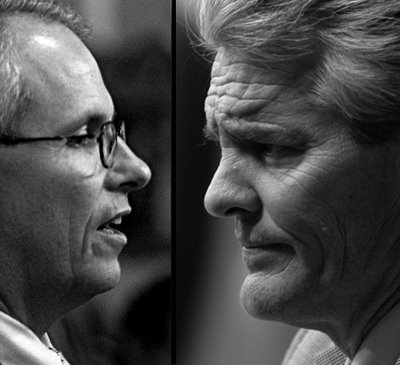 Ludwick suggests that there is a battle brewing between Mayor Martin Chávez, left and Councillor Brad Winter, an Albuquerque Public Schools employee, over the mayor’s efforts to take control of the school system.
Ludwick suggests that there is a battle brewing between Mayor Martin Chávez, left and Councillor Brad Winter, an Albuquerque Public Schools employee, over the mayor’s efforts to take control of the school system.Chávez defeated Winter in last year’s mayoral race. At the beginning of the mayor’s 2001 term, his now Chief Administrative Officer Bruce Perlman, below, was then treasurer of Chávez’ campaign and he continued to gather money forming ABQPAC, “as a neat and nifty way to,” funnel money to Chávez for personal expenses.
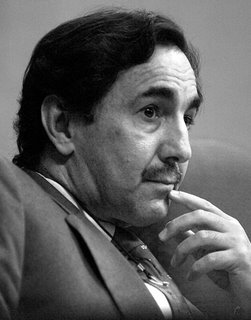
Chávez and the ABQPAC were charged and found to have violated several sections of the city charter’s ethics rules.
Chávez received a public reprimand and returned some $69,000 to the ABQPAC. Clearly the ABQPAC was conducting illegal activities, though the Attorney General refused to look into the matter and the District Attorney failed to take jurisdiction.
Current Councilor Ken Sanchez also received a campaign contribution in his unsuccessful bid in the Democratic primary for New Mexico State Treasurer.
Ludwick quoted Perlman, about adding to the existing ethics proposals saying, “It's a big concern of the mayor. It also is a big concern of some of the councilors."
The city council has a long history of councillors working for other government agencies outside of the city while serving and voting on issues concerning conflicts of employers, family or personal interests without so much as publicly disclosing their connections during the particular debate.
 Councillors Ruth Adams, Alan Armijo, Michael Brasher, Steve Gallegos Vince Griego and Angela Robbins.
Councillors Ruth Adams, Alan Armijo, Michael Brasher, Steve Gallegos Vince Griego and Angela Robbins.This is not an exhaustive list, but during two terms, the 11th and 12th councils from 1994-97, Councillors Alan Armijo, Michael Brasher and Angela Robbins were all employees of APS. Armijo lobbied for the schools at the state legislature. Brasher’s wife also worked for the city. Vince Griego worked for Bernalillo County and had several sons on the city’s payroll. Steve Gallegos was sergeant at arms for the State Senate.
I always thought that such cross-governmental relationships were conflicts of interest.
The most brazen conflict of interest on the council I ever saw displayed was by Ruth Adams. There was a discussion about a zoning waiver on a particular downtown city block. A citizen was testifying about a particular apartment building and he indicated a certain number of units in the building. Adams questioned him about how he had determined the number. He responded that he had counted the mailboxes. Adams told him he was wrong, He asked how she knew he was wrong and asked what the right number was because he wanted to be precise in his testimony. Adams said the number of units was two higher than he said and she knew because she owned the building.
The council dais was thrown into nothing less than a dither. The following discussion of the council gave a fascinating insight to how that particular term viewed conflicts of interest. Adams never perceived herself to be subject to any conflict and didn’t recognize it until it bit her and then she was shocked and surprised when her fellow councillors voted her to be in conflict. She left protesting that she still had the right to vote.
 Here is Ruth Adams, after leaving the council with Sally Davis of Common Cause monitoring the Chávez-ABQPAC ethics board hearings. Common Cause was one of three complainants who filed charges of ethics violations of Chávez and the ABQPAC. Davis is now a council recommended member of the city’s ethics board.
Here is Ruth Adams, after leaving the council with Sally Davis of Common Cause monitoring the Chávez-ABQPAC ethics board hearings. Common Cause was one of three complainants who filed charges of ethics violations of Chávez and the ABQPAC. Davis is now a council recommended member of the city’s ethics board.Let’s not forget those who have potential conflicts of interest who sit on the current council.
The aforementioned APS link with Winter and Sally Mayer’s association with real estate and developers are examples. There are other considerations that many might try to dismiss having to do with councillors’ past associations with the city; Issac Benton’s architecture firm formerly being under contract; Don Harris having been an assistant city attorney and Loy having retired as a captain from the police department.
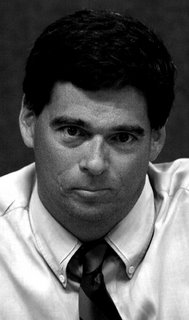 Councillor Michael Cadigan, left, should be singled out as frequently recusing himself from participation from matters where he, as an attorney or his firm, represents an interest that is or might give the appearance of being in conflict. This should be to his credit by removing himself, but it raises a question. If he has to recuse himself so often for potential conflicts, is he too close to begin with?
Councillor Michael Cadigan, left, should be singled out as frequently recusing himself from participation from matters where he, as an attorney or his firm, represents an interest that is or might give the appearance of being in conflict. This should be to his credit by removing himself, but it raises a question. If he has to recuse himself so often for potential conflicts, is he too close to begin with?Councillor Craig Loy’s amendment reads;
“No member of the City Council shall… During their term of office participate in any debate or vote on any matter which will likely result in any benefit to the member which benefit is greater than the benefit to the public in general. A benefit for purposes of this paragraph shall mean a financial benefit or a benefit conferred by the City Council member’s employer as a direct result of the member’s participation in the matter.”
The mayor is not similarly constrained in such a way by the current proposed bills. He is only required to disclose any possible conflicts of interest by association with a campaign contributor when he recommends that person who has applied for a professional/technical services contract in excess of $55,000, when they are other than the top recommended offeror. The requirement to disclose is only limited to one and a half years after the contribution.
This neither provides full disclosure nor maintains a degree of political balance. By shifting the balance of political power towards the mayor and eliminating councillors participation in a debate or vote where there is a conflict, this does not hold the mayor to the same standard of disclosure.
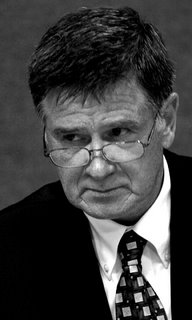 At the right is Councillor Loy, whose amendment is possibly a step in the right direction. However, its implementation without the inclusion of the mayor to equal prohibitions will make matters worse, not better.
At the right is Councillor Loy, whose amendment is possibly a step in the right direction. However, its implementation without the inclusion of the mayor to equal prohibitions will make matters worse, not better.Ethics is a fine line. Determining campaign contributor and employer conflicts of interest can get tricky.
What is sorely lacking from all these proposals is any meaningful commitment to ethics in our community!
The Cub Scouts have a better ethics handbook than does the City of Albuquerque; and they teach it.
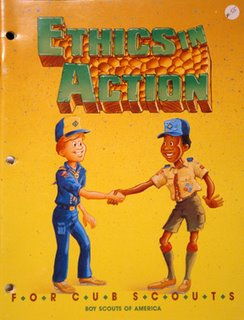 What is needed are serious discussions before drafting a comprehensive piece of legislation with accurate definitions, concise and precise prohibitions, guidance and an educational component for all elected officials, appointed committee members, city staff and employees at every level. A system of ethics counselors or ombudsmen that encourage all to determine, clarify and resolve ethical questions without threatening employees with punishment for seeking to do the right thing in exposing mischief, errors, inappropriate political influence, wrongdoing, corruption or illegality.
What is needed are serious discussions before drafting a comprehensive piece of legislation with accurate definitions, concise and precise prohibitions, guidance and an educational component for all elected officials, appointed committee members, city staff and employees at every level. A system of ethics counselors or ombudsmen that encourage all to determine, clarify and resolve ethical questions without threatening employees with punishment for seeking to do the right thing in exposing mischief, errors, inappropriate political influence, wrongdoing, corruption or illegality.It’s time to scrap this knee-jerk reactionary approach to ethics reform that the city repeatedly engages in. Start from scratch with a diverse group of citizens and a few politicians to accurately study ethics, to find the best examples of programs around the country that work effectively. Take the burden off those who may be tempted by their elected and appointed positions to manipulate the rules to create personal and political advantages, loopholes, exceptions and privileges that can be exploited against the public good. Put the matter to a public vote so the people determine how their officials and employees should behave.
You do know what the difference is between the Cub Scouts and the City of Albuquerque? The Scouts have adult leadership!
No comments:
Post a Comment